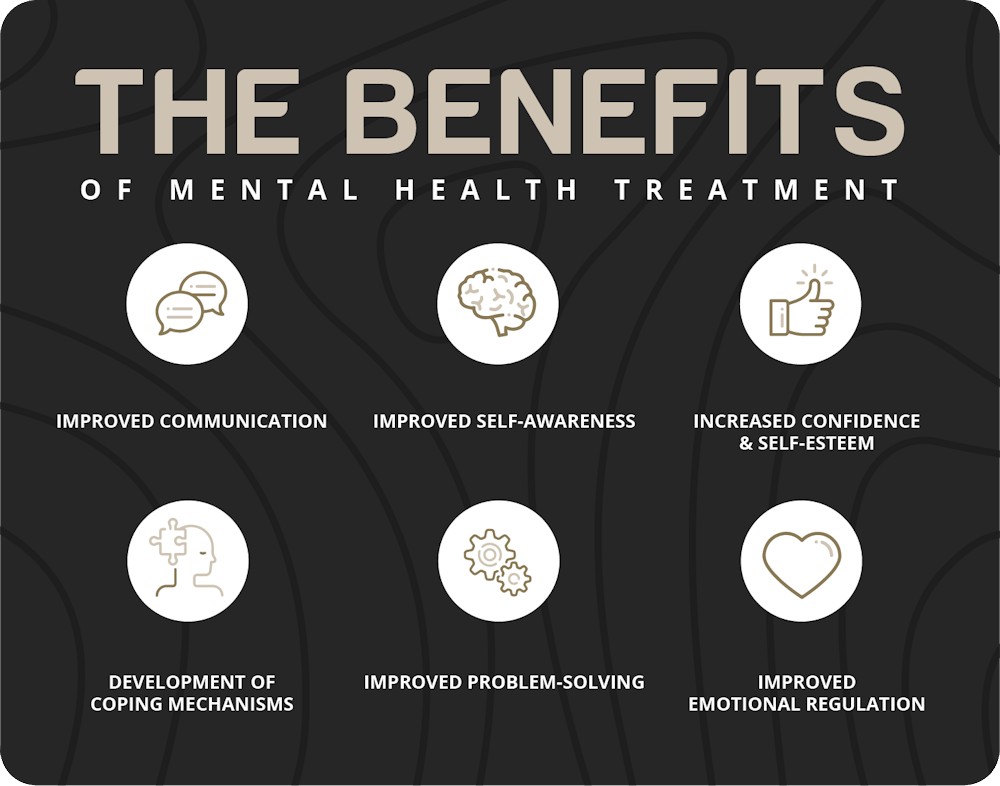Some Ideas on Mental Health Counseling You Should Know
Wiki Article
Getting The Mental Health Counseling To Work
Table of ContentsWhat Does Mental Health Counseling Do?Indicators on Mental Health Counseling You Should KnowSome Known Questions About Mental Health Counseling.The Ultimate Guide To Mental Health CounselingWhat Does Mental Health Counseling Mean?
Through therapy, you can acquire understanding right into your own patterns of behavior and interaction, which can result in more satisfying and pleasing connections with close friends, household, and romantic partners. What we assume, we manifest. If you're consumed with unfavorable feelings and adverse ideas that are disrupting your life, therapy can aid.Like our ideas, sometimes our habits become damaging. They can maintain us from living a positive and healthy way of living. Maybe you fight with dependency, or you often tend to self-sabotage, or there are other unfavorable ways you behave. Mental Health Counseling. Treatment can help you modify those behaviors that are having a negative effect on your globe and relationships.

Getting treatment to resolve specific elements of your life can help you be much more efficient in various other areas, consisting of job.
:max_bytes(150000):strip_icc()/VWH-MichelaButtignolCounselingFor-MentalHealth-4000x2700-35491a98e57746399614c4ef7f3833a1.png)
Some Ideas on Mental Health Counseling You Should Know
You can see a specialist when things are going truly well in your life, or when you're concerning to undergo a huge life shift." Talkspace therapist Kate Rosenblatt, MA, LPC, LMHC. However there are also more benefits of treatment than simply the ones we have actually gone over. Treatment can show you just how to manage separation, handle despair, or develop relationships (romantic or those with household or close friends) in a healthy and balanced method.For the objective of the here and now study, regarded advantages and obstacles to mental health and wellness help-seeking are being discovered. Previous research study located that regarded obstacles have a significant result on university students' health habits selections (Von Ah, Ebert, Ngamvitroj, Park & Kang, 2003). Viewed advantages and barriers to help-seeking were especially selected due to their influence on decision-making and eventually action (Glanz, Rimer, & Su, 2005).
The present research study looks for to analyze whether or not stigma offers as an obstacle to treatment amongst college pupils. Among these were: (1) choosing to deal with mental health issues themselves, (2) not having sufficient time to participate in treatment, (3) concerns concerning whether mental wellness therapy is effective in remediating issues, (4) an idea that anxiety is typical or the trouble will obtain much website link better without treatment, (5) lack of money, and (6) stress about what others would think if they found out concerning therapy engagement.
Personnel in campus psychological health facilities might be perceived as hostile, and long wait times for solutions may be "repulsive" for pupils. Variables facilitating more positive perspectives are usually at the contrary pole of those variables determined as barriers.
A Biased View of Mental Health Counseling
One in three (34.6%) reported surviving university and one in 4 (23.3%) reported dealing with moms and dads. Almost half of students were involved in campus organizations and 1 in 10 reported remaining in a fraternity or sorority. Even more than one-third of great site pupils (38.1%) reported that they had a relative or close friend with an identified psychological health problem.

Rumored Buzz on Mental Health Counseling
Univariate F-tests identified certain subscale things that significantly differed. Women were less likely than males to view individuals that most likely to therapy as psychologically weak, individuals who most likely to counseling as insane, to really feel that individuals with mental wellness troubles must manage problems by themselves, that people that most likely to therapy as unable to address troubles, that people who go to therapy are careless, and to feel that individuals who most likely to therapy are various from regular people in a negative way.Similarly, research study results exposed that females were substantially much less most likely than males to hold stigma-related attitudes. This is constant with previous research which additionally located that men hold higher degrees of viewed stigma than women (Chandra & Minkovitz, 2006). Based upon research study findings, it appears that males may be less likely than women to look for treatment as a result of low viewed obstacles as well as high stigma-related attitudes.
A Biased View of Mental Health Counseling
In enhancement, college health professionals might offer educational programs targeting men with details on the benefits of mental health treatment and the importance of seeking aid when required., the present study found no read here significant differences in the number of perceived obstacles to help-seeking actions based on sex.Scientist guess that this is primarily because of conventional social norms and gender duties that characterized men based upon strength and absence of psychological expression (Addis & Mahalik, 2003; Ang, Lim, Tan, & Yau, 2004; Mojtabai, 2007). Generally, there have actually been combined outcomes amongst the university student population pertaining to sex differences (Rosenthal & Wilson, 2008). This searching for was unforeseen and can highlight that those who had obtained therapy had a far better idea of wait times and other "access" obstacles that may make it tough to begin therapy. Probably, participants who have actually obtained therapy view more obstacles than participants that have not obtained counseling since seeking therapy solutions again could entail anxiety of self-disclosing personal info to a new therapist.
Report this wiki page